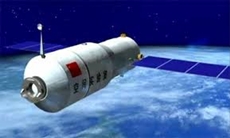China’s defunct space station on crash course with Earth
13 Jul 2016
China's first space station might be in free fall in space and on its way to crashing back down to Earth.
 The Tiangong-1 was launched in 2011, and should have come back down to Earth in the ocean in a controlled crash. But watchers have said that it now appears to have gone into freewill, with China losing control of it, and so it could crash down onto the Earth any time.
The Tiangong-1 was launched in 2011, and should have come back down to Earth in the ocean in a controlled crash. But watchers have said that it now appears to have gone into freewill, with China losing control of it, and so it could crash down onto the Earth any time.
The 8-ton space lab and test-bed, also known as 'Heavenly Palace', is one of only two space stations – the other being the ISS (International Space Station). The observations of its gradual fall were made by amateur satellite tracker Thomas Dorman. Dorman has been documenting flyovers of satellites using telescopes, videos and still cameras, along with some other gear.
Like other lost satellites, it's likely that the free-falling station would burn up on its way back into Earth and come back down as molten metal rather than with a big crash. But people have warned that it could still be a ''real bad day'' if the rocket fell back down to Earth, ''but odds are it will land in the ocean or in an unpopulated area''.
The huge size of the satellite means that parts of it could still make their way through the searing heat of entry back into the atmosphere, and so cause problems when they arrive back on Earth.
China had hoped to use the satellite as the beginning of a station or space lab to rival the ISS. It finished its work in 2013, after being used for docking exercises that helped build other stations.
Since then it has been in an ''operation management phase'', which sees its orbit controlled as it flies around Earth. It still undertakes some investigative and scientific work as it gets ready to come back to Earth, according to a statement from Chinese officials.
The China Manned Space Engineering (CMSE) office announced in March 2016 that Tiangong's data-gathering activities were terminated and the space station had lost telemetry link – dooming the satellite to an uncontrolled fall in the future, according to an official Chinese news agency report. It was launched with a life of two years.
The Chinese space authorities have not clarified when the Tiangong will make its re-entry in to Earth's atmosphere, even though its operational life is over.
Dorman has been watching the movement of the satellite and believes that China has lost control of it. The fact that China has given no public statement on its safety could mean that it is lost, he told Space.com.
"If I am right, China will wait until the last minute to let the world know it has a problem with their space station," Dorman said.


















